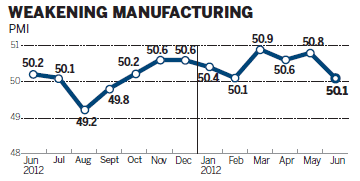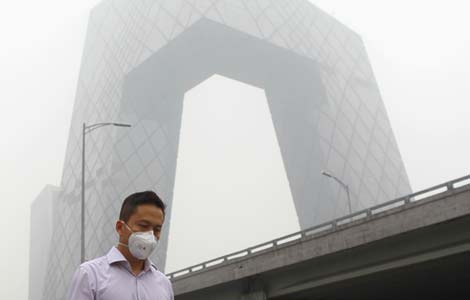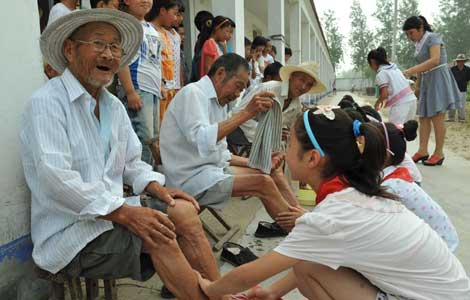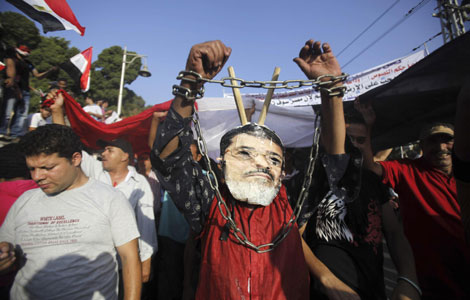Factory activity lowest in 4 months
Updated: 2013-07-02 08:02
By Chen Jia in Beijing, Fu Jing in Brussels and Yu Ran in Shanghai (China Daily)
|
||||||||

Slowdown 'normal' as country tries to readjust its economic structure
Factory activity declined in June, with the government appearing prepared for a slower-than-ever growth rate during structural reforms to the economy.
The Purchasing Managers' Index, a gauge that mainly indicates operating conditions in the manufacturing sector, slipped to a four-month low of 50.1 from 50.8 in May, the National Bureau of Statistics reported on Monday.
A separate PMI survey, conducted by HSBC Holdings, showed an even lower index for the sector in June - a three-quarter low of 48.2 - down from 49.2 in May and 50.4 in April.
For both indexes, a reading higher than 50 means expansion, while below 50 indicates contraction.
A lack of increased new orders was seen by the two surveys as the main reason restraining manufacturing activities.
Qu Hongbin, HSBC's chief economist in China, said the sluggish factory production may signal a maintained economic slowdown in the second quarter from 7.7 percent growth in the first three months.
"The liquidity squeeze in the interbank market during the past two weeks is likely to slow expansion of off-balance-sheet lending, further exacerbating funding conditions for small and medium-sized enterprises, adding pressure on employment," Qu said.
But a hard landing for the economy is impossible, he stressed.
In China, the manufacturing sector contributes about 40 percent of GDP, with 60 percent coming from SMEs. About 80 percent of jobs are provided by small businesses.
David Laurier, CEO of Belgium-based environmental company AppliTec, said the slowdown in economic activity has resulted from internal and external factors. The lower PMI in China is "normal" as the country is going in the right direction of restructuring its economy from high-speed growth to medium-paced growth, he said.
"The new leadership has adopted different approaches to credit management and restructuring the economy and is focusing on sustainability of this big country's development," Laurier said. "As the current leadership team has pledged to focus on development quality since it took office, we, as foreign businessmen, should also adjust ourselves to a slower pace."
Qin Hao, deputy general manager of Jiangsu Allyrise Pharmaceutical Co, said, "As the global economic recovery has been much slower than expected, the advantage of our chemical and pharmaceutical products has been weakened and profits have been reduced."
The competition has been tougher when Southeast Asian countries have tried to manufacture the same products but with lower prices, as the cost of materials and labor in these nations is much lower, Qin added
The company has been forced to turn down some orders, as it cannot make any profit from them.
"After half a year waiting without seeing any obvious improvement, we are not very confident about the complete recovery of the export trading industry in the next two years," Qin said.
Lu Zhengwei, chief economist at Industrial Bank, said weakening confidence among enterprises may suggest a further economic slowdown.
Dwindling new orders, increasing financial difficulties and exchange rate appreciation have exerted considerable pressure on manufacturing companies, Lu said.
The National Bureau of Statistics plans to release economic indicators for the second quarter on July 15.
Market observers tried to seek clues to the next step in government policy from a speech President Xi Jinping gave during the weekend in which he said China should no longer evaluate the performance of leaders simply by GDP growth.
Analysts said this may be another sign that the new leaders will be more concerned about the quality of growth rather than the quantity, and speculated that no more aggressive stimulus measures will be announced in the near term.
Fredrik Erixon, director of the European Centre for International Political Economy in Brussels, said the slowdown in economic activity in China has answered a number of issues raised by the new leadership.
"The new leadership has emphasized time and again that the market should play its due role in China's economic development," said Erixon, adding that he has sensed that government intervention in economic activities has been declining.
"China's new leadership has been designing intensive programs for urbanization and reform and they will be rolled out later this year," he said. "These programs will keep China's economy on track if they are properly designed and implemented."
However, Liu Ligang, chief Chinese economist at ANZ Bank, suggested the central bank might take measures to rebuild market confidence.
"The People's Bank of China needs to cut the interest rate by at least 25 basis points to avoid a further slip in the economy," Liu said.
Contact the writers at chenjia1@chinadaily.com.cn
(China Daily USA 07/02/2013 page1)

 Egypt army gives Mursi 48 hours to share power
Egypt army gives Mursi 48 hours to share power
 No quick end in sight for Beijing smog
No quick end in sight for Beijing smog
 New filial law sparks debate
New filial law sparks debate
 Bakelants claims Tour de France second stage
Bakelants claims Tour de France second stage
 2013 BET Awards in Los Angeles
2013 BET Awards in Los Angeles
 Gay pride parade around the world
Gay pride parade around the world
 Four dead in Egypt clashes, scores wounded
Four dead in Egypt clashes, scores wounded
 New NSA spying allegations rile European allies
New NSA spying allegations rile European allies
Most Viewed
Editor's Picks

|

|

|

|

|

|
Today's Top News
Kerry hails China's denuclearization bid
19 firefighters killed in Arizona fire
Book reveals islands' true history
Tokyo warned not to resort to 'empty talk'
Snowden applies for Russian asylum
No quick end in sight for Beijing smog
New home prices defy curbs
Mandela 'still critical but stable'
US Weekly

|

|






